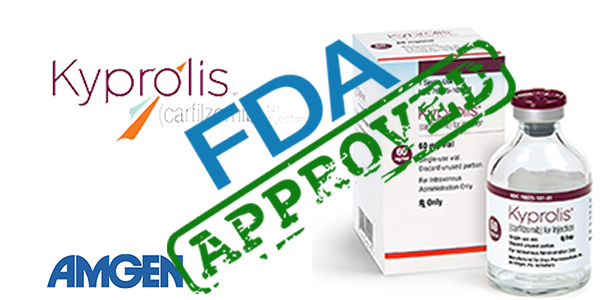KYPROLIS, Lenalidomide and Dexamethasone Extended Median Overall Survival in Relapsed or Refractory Multiple Myeloma Patients to 48 Months.
The FDA has approved the addition of positive survival data from the ASPIRE Phase 3 clinical trial to the Kyprolis prescribing information, which found treatment significantly lowered a risk of death for patients with relapsed or refractory multiple myeloma, and extended overall survival by a median of 7.9 months.
Data added to the label showed that KYPROLIS, lenalidomide and dexamethasone (KRd) significantly reduced the risk of death by 21 percent and extended overall survival by 7.9 months versus lenalidomide and dexamethasone alone (Rd) in patients with relapsed or refractory multiple myeloma (median OS 48.3 months for KRd versus 40.4 months for Rd, HR=0.79, 95 percent CI, 0.67 – 0.95; two-sided p=0.0091).
The international, randomized Phase 3 ASPIRE (CArfilzomib, Lenalidomide, and DexamethaSone versus Lenalidomide and Dexamethasone for the treatment of PatIents with Relapsed Multiple MyEloma) trial (NCT01080391) evaluated KYPROLIS in combination with lenalidomide and dexamethasone, versus lenalidomide and dexamethasone alone, in patients with relapsed or refractory multiple myeloma following treatment with one to three prior regimens. The primary endpoint of the trial was progression-free survival (PFS), defined as the time from treatment initiation to disease progression or death. Secondary endpoints included OS, overall response rate (ORR), duration of response (DoR), disease control rate, health-related quality of life (QOL) and safety. Patients were randomized to receive KYPROLIS (20 mg/m2 on days 1 and 2 of cycle one, escalating to 27 mg/m2 on days 8, 9, 15 and 16 of cycle one and continuing on days 1, 2, 8, 9, 15 and 16 of subsequent cycles), in addition to a standard dosing schedule of lenalidomide (25 mg per day for 21 days on, seven days off) and low-dose dexamethasone (40 mg per week in four-week cycles), versus lenalidomide and low-dose dexamethasone alone. The study randomized 792 patients at sites in North America, Europe and Israel.
Full OS results from ASPIRE were published earlier this year in the Journal of Clinical Oncology. Initial results from this study were published in the The New England Journal of Medicine in 2015. The safety data were consistent with the known safety profile of KYPROLIS.
“Amgen is focused on advancing treatment options that have the potential to transform outcomes for patients,” said David M. Reese, M.D., senior vice president of Translational Sciences and Oncology at Amgen. “The ASPIRE trial showed significant improvement in survival in patients with relapsed or refractory multiple myeloma who received KYPROLIS as part of a triplet regimen. With this approval, the U.S. Prescribing Information for KYPROLIS now includes positive overall survival data from two Phase 3 trials, underscoring the important role of proteasome inhibition in the treatment of multiple myeloma.”

